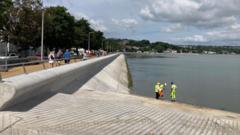What Happened When a TV Newsreader Reacted to an Israel Missile Strike?

The Complex Dynamics of the Druze Community in Israel and Syria
The Druze community, a unique religious and ethnic group, has played a significant yet often overlooked role in the geopolitical landscape of the Middle East. Primarily residing in Israel and Syria, the Druze have forged a complex relationship with the state, particularly in the context of ongoing regional conflicts. The recent military actions by the Israel Defense Forces (IDF) within Syria, particularly concerning the Druze minorities, highlight a multifaceted situation that intertwines loyalty, conflict, and identity. This article delves into the intricate dynamics surrounding the Druze in Israel and Syria, exploring their historical significance, current challenges, and the implications of military actions in the region.
Understanding the Druze Community
The Druze community originates from the Middle East and is characterized by its unique blend of religious beliefs, which incorporate elements from Ismailism, Gnosticism, Neoplatonism, and other philosophies. Unlike many other religious groups, the Druze do not actively seek converts, and their faith is often shrouded in secrecy. The majority of Druze reside in Lebanon, Syria, and Israel, with significant communities in each country.
The Druze in Israel
In Israel, the Druze community is recognized as a loyal minority, and many members have served in the Israeli military. This military service has fostered a sense of belonging and loyalty towards the Israeli state, differentiating them from other Arab communities within Israel. The Druze have historically aligned themselves with the state, often participating in national defense and contributing to the country's security.
- Military Service: The Druze serve in the IDF, with a high enlistment rate compared to other Arab populations in Israel.
- Political Representation: The Druze community has political representation in the Knesset and engages in Israeli political life, advocating for their rights and interests.
- Cultural Identity: Despite their loyalty to Israel, the Druze maintain a distinct cultural identity, with unique customs, traditions, and religious practices.
The Druze in Syria
In Syria, the Druze population is concentrated primarily in the southwestern region of Sweida. The community has historically been cautious of the central government's authority. As the Syrian civil war unfolded, the Druze faced increasing pressures, leading to divisions within the community over how to respond to the changing political landscape.
- Internal Divisions: The Druze in Syria are split between those who advocate for integration into the new political system and those who call for greater autonomy.
- Conflict and Tension: The relationship between the Druze and the Assad regime has been strained, marked by distrust and calls for independence.
- Recent Violence: The ongoing conflict has seen clashes between Druze factions and the Syrian government, exacerbating fears of violence and repression.
The Escalating Military Conflict
Recent military actions in Syria have drawn the attention of the international community, particularly due to Israel's involvement. Following a series of kidnappings and retaliatory attacks between local Sunni Bedouin tribes and Druze factions, the situation has spiraled into violence, prompting responses from both the Syrian government and Israeli forces.
Israel's Military Actions
The IDF has conducted airstrikes in Syria, targeting what it describes as threats to the Druze community and Israel's national security. Israeli officials have justified these actions by emphasizing the need to protect Druze civilians from the Syrian regime's military operations.
- Defensive Measures: The Israeli government claims that its military strikes aim to counter threats posed by the Assad regime and its allied militias.
- Protection of Minorities: Israeli officials have publicly stated their commitment to safeguarding the Druze community from potential harm and oppression.
- Geopolitical Strategy: These military actions are part of a broader Israeli strategy to maintain security along its borders and prevent hostile entities from gaining a foothold near its territory.
The Syrian Government's Response
The Syrian government, bolstered by its military alliances, has also responded to the unrest in Sweida. The Defence Ministry has accused local Druze militias of violating ceasefire agreements, leading to intensified military operations against them. Reports of extrajudicial killings, looting, and the burning of civilian homes have emerged, further escalating tensions.
- Ceasefire Violations: The Syrian government claims that certain Druze factions have breached ceasefire agreements, leading to retaliatory actions.
- Government Forces Clashing with Druze: As government forces attempt to restore order, they have engaged in violent confrontations with Druze armed groups.
- Human Rights Concerns: Several organizations have raised alarms about the human rights violations occurring amid these clashes, calling for accountability.
The Social and Cultural Impact of Ongoing Conflict
The conflict in Syria and the military interventions by Israel have profound implications for the Druze community, impacting their social fabric and cultural identity. The ongoing violence has led to a cycle of fear, mistrust, and division within the community.
Sociopolitical Ramifications
The Druze community faces significant sociopolitical ramifications as they navigate their identity amid escalating violence. The choices made by community leaders and political figures will shape the future of the Druze in both Israel and Syria.
- Calls for Surrender: Recently, Druze religious leaders in Syria have called for armed factions to surrender their weapons and cooperate with authorities, reflecting a desire for stability.
- Community Divisions: The internal divisions within the Druze community have grown, with some advocating for integration while others seek autonomy or a hybrid approach.
- Identity Crisis: The ongoing conflict has sparked an identity crisis among the Druze, as they grapple with their loyalty to their nation versus their ethnic and religious identity.
The Role of Social Media
Social media has become a powerful tool in the ongoing conflict, providing a platform for various factions to express their views and mobilize support. Videos depicting violence and the treatment of Druze captives have circulated widely, intensifying emotions and reactions within the community.
- Mobilization of Support: Social media has been used to galvanize support for various factions, amplifying calls for action within the Druze community.
- Documentation of Violence: Graphic videos and reports of violence have raised awareness of the humanitarian crisis facing the Druze in Syria.
- Counter-Narratives: Different factions utilize social media to disseminate their perspectives, leading to a battle of narratives that further complicates the situation.
The Future of the Druze Community
The future of the Druze community in both Israel and Syria remains uncertain amidst ongoing violence and political instability. The decisions made in the coming months will have lasting effects on their social, cultural, and political landscape.
Potential Paths Forward
As the situation evolves, several potential paths could emerge for the Druze community:
- Integration into New Systems: Some members may choose to integrate into the emerging political structures in Syria, seeking to secure their rights and representation.
- Pursuit of Autonomy: Others may push for greater autonomy, advocating for the establishment of a Druze region that can govern itself independently.
- Continued Advocacy for Rights: The Druze in Israel may continue to advocate for their rights and seek to maintain their unique cultural identity within the Israeli state.
Conclusion
The complexities surrounding the Druze community in Israel and Syria are emblematic of the broader challenges facing minority groups in regions marked by conflict. As the situation continues to evolve, the Druze will need to navigate their loyalties, identities, and aspirations in a precarious landscape. The ongoing military actions and political developments will undoubtedly shape the future of the Druze community, affecting their role in the region and their relationship with both Israel and Syria.
As we reflect on the dynamics surrounding the Druze community, it raises important questions about identity, loyalty, and the impact of conflict on minority groups. How will the Druze navigate their future amidst the complexities of regional politics and conflict? #DruzeCommunity #MiddleEastConflict #CulturalIdentity
FAQs
What is the Druze religion?
The Druze religion is a monotheistic faith that incorporates elements from various philosophical and religious traditions, including Ismailism and Gnosticism. The community is known for its secretive practices and strong emphasis on community loyalty.
How do the Druze contribute to Israeli society?
The Druze community in Israel actively serves in the military, participates in politics, and contributes to various sectors of society. They are recognized for their loyalty to the state and have a distinct cultural identity that they maintain alongside their Israeli citizenship.
What challenges do the Druze face in Syria?
In Syria, the Druze face significant challenges, including political repression, internal divisions, and violence from both government forces and rival factions. The ongoing conflict has led to calls for greater autonomy and protection of their rights.
Published: 2025-07-16 13:47:03 | Category: News



